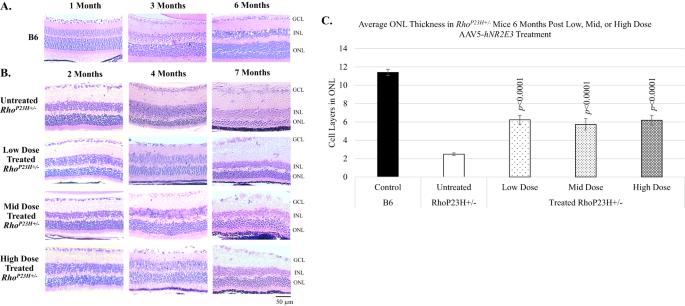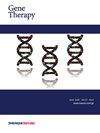临床前剂量反应研究显示,NR2E3 可减轻视网膜色素变性小鼠模型 RhoP23H+/ 的视网膜变性。
IF 4.6
3区 医学
Q1 BIOCHEMISTRY & MOLECULAR BIOLOGY
引用次数: 0
摘要
视网膜色素变性(RP)是一种异质性疾病,也是遗传性视网膜疾病(IRD)中导致视力丧失的主要原因。遗传性视网膜疾病(IRDs)是一组罕见疾病,由 280 多个基因中的一个或多个基因突变引起,最终导致失明。修饰基因在调节疾病表型方面起着关键作用,它们的突变会影响疾病的结果、进展速度和严重程度。我们之前的研究已经证明,核荷尔蒙受体 2 家族 e 成员 3(Nr2e3)基因可以减少 RhoP23H-/- 小鼠的疾病进展和感光细胞层的丧失。这项后续药理学研究评估了与临床相关的杂合 RhoP23H 小鼠的纵向 NR2E3 剂量反应。在使用三种不同剂量的 NR2E3 治疗 6 个月后,观察到视网膜变性减少,视网膜形态改善。组织学和免疫组化分析显示,治疗后的 RhoP23H+/- 小鼠视网膜中的感光器区域得到了挽救。通过视网膜电图(ERG)进行的功能评估显示,所有剂量的光感受器变性均有所减轻。这项研究证明了不同剂量的NR2E3在减少视网膜变性方面的有效性,并为RhoP23H相关RP临床试验的剂量选择提供了参考。本文章由计算机程序翻译,如有差异,请以英文原文为准。


Preclinical dose response study shows NR2E3 can attenuate retinal degeneration in the retinitis pigmentosa mouse model RhoP23H+/−
Retinitis pigmentosa (RP) is a heterogeneous disease and the main cause of vision loss within the group of inherited retinal diseases (IRDs). IRDs are a group of rare disorders caused by mutations in one or more of over 280 genes which ultimately result in blindness. Modifier genes play a key role in modulating disease phenotypes, and mutations in them can affect disease outcomes, rate of progression, and severity. Our previous studies have demonstrated that the nuclear hormone receptor 2 family e, member 3 (Nr2e3) gene reduced disease progression and loss of photoreceptor cell layers in RhoP23H−/− mice. This follow up, pharmacology study evaluates a longitudinal NR2E3 dose response in the clinically relevant heterozygous RhoP23H mouse. Reduced retinal degeneration and improved retinal morphology was observed 6 months following treatment evaluating three different NR2E3 doses. Histological and immunohistochemical analysis revealed regions of photoreceptor rescue in the treated retinas of RhoP23H+/− mice. Functional assessment by electroretinogram (ERG) showed attenuated photoreceptor degeneration with all doses. This study demonstrates the effectiveness of different doses of NR2E3 at reducing retinal degeneration and informs dose selection for clinical trials of RhoP23H-associated RP.
求助全文
通过发布文献求助,成功后即可免费获取论文全文。
去求助
来源期刊

Gene Therapy
医学-生化与分子生物学
CiteScore
9.70
自引率
2.00%
发文量
67
审稿时长
4-8 weeks
期刊介绍:
Gene Therapy covers both the research and clinical applications of novel therapeutic techniques based on a genetic component. Over the last few decades, significant advances in technologies ranging from identifying novel genetic targets that cause disease through to clinical studies, which show therapeutic benefit, have elevated this multidisciplinary field to the forefront of modern medicine.
 求助内容:
求助内容: 应助结果提醒方式:
应助结果提醒方式:


